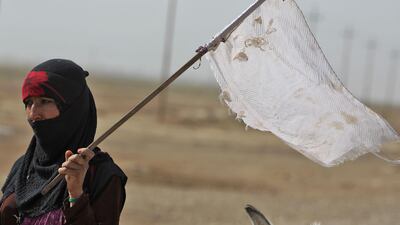Aid agencies in Iraq are concerned that escalating tensions surrounding the controversial Kurdish independence referendum could jeopardise efforts to help the country's displaced population.
Baghdad is furious at the Kurdistan Regional Government (KRG) for going ahead with last week's vote in which an overwhelming majority of Kurds voted in favour of seceding from Iraq. Turkey and Iran have also been hostile towards the move, fearing the referendum — which Kurdish president Masoud Barzani has billed as a prelude to independence — will encourage separatism among their own Kurdish minorities. Unsurprisingly, both countries have been supportive of Iraqi moves to isolate the Kurdish region.
In the wake of the referendum last Monday, access to the Kurdish region has been severely restricted. The Iraqi government closed the airspace over the autonomous zone to international arrivals on Friday and has threatened to take control of border crossings.
The central government in Baghdad is using the flight ban to pressure the KRG into handing over control of its airports — a demand the Kurds have rejected.
But beyond the politics, the standoff risks limiting access to the rest of Iraq for the many humanitarian organisations that have based themselves in the autonomous Kurdish zone. It could also affect the supply of aid into the Kurdish region itself, much of which arrives by lorry via Turkey.
Deteriorating relations could even lead to a total closure of internal borders, which would deny aid agencies access to hundreds of thousands of Iraqis displaced by the battle to retake Mosul from ISIL.
The United Nations, which co-ordinates the international response to Iraq's humanitarian crisis, has already voiced its disquiet.
"We’re obviously concerned at the mounting tensions," Stephane Dujarric, the spokesman for the UN Secretary-General Antonio Guterres, said in a press briefing at the United Nations Headquarters in New York on Friday.
"We would not want to see any disruption to our own humanitarian work or to that of the NGOs."
Following on the heels of a three-year war to defeat ISIL, Iraq's latest crisis comes at a precarious time. Around 3.2 million Iraqis are still internally-displaced, and more are leaving their homes as the final pockets of territory held by ISIL are attacked by the Iraqi military in the town of Hawija and Anbar province.
A huge number of Iraqis displaced by the battle against ISIL have fled to Kurdish-controlled areas: As of April 2017, the KRG said it was sheltering about 1.3 million displaced Iraqis.
Around 800,000 civilians were still displaced from Mosul at the end of June, shortly before the end of the battle, according to the International Organisation for Migration. Most of those displaced in the latter stages of the nine month-long battle ended up in displacement camps near the city, in areas controlled by the federal government. Those escaping the fighting in the early stages of campaign mainly fled to Kurdish-controlled areas.
With Baghdad unable to deal with the humanitarian crisis, the international aid sector is crucial in bringing relief to Iraqis in need.
As of Tuesday, aid agencies were still able to cross the internal border from the Kurdish region into federal Iraq, according to Heidi Diedrich, country director at the Norwegian Refugee Council, which is working in displacement camps at Hammam Al Alil, a small town on the outskirts of Mosul.
Both the central government and the KRG have pledged to keep humanitarian efforts running in spite of the referendum crisis, Ms Diedrich said, but NGOs are worried that this might change.
"Of course it's a concern, and we are monitoring it daily. The entire humanitarian community is monitoring it," she added.
The Mosul relief effort is particularly vulnerable to tensions between Baghdad and the Kurds; virtually all aid agencies involved in helping civilians displaced from Mosul operate out of the Kurdish region. Thousands of NGO staff, both foreign and local, took advantage of the zone's close proximity to Mosul — in peacetime, Iraq's second city is only an hour's drive away from Erbil, the Kurdish capital — along with high levels of security in the Kurdish region and regular flights from Erbil's international airport.
Foreigners could previously arrive in the Kurdish region without an Iraqi visa and could stay long term with a KRG residency permit. With international flights now on hold, aid workers with no Iraqi visa now have to travel by land to leave the country. They are also not able to enter the Kurdish region without an Iraqi visa, leaving international staff who were out of the country prior to the referendum unable to return to their work.
"Those who travelled out of the country for work are not yet able to return. We are not sending staff out of the country until this has been resolved," said Ms Diedrich, who added that the UN is in talks with the Iraqi government over the issue.
The referendum has also had repercussions for local NGO staff, who outnumber expats. Aid agencies privately complain that Kurdish staff travelling into federally-administered areas now have to deal with hostility from security forces and the local population, making it difficult for them to deliver aid and services.
This animosity could be a precursor to a much bigger crisis.
If tensions between Baghdad and Erbil get further out of hand, the situation could develop into a full-scale military conflict. This would sever access to displacement camps on Iraqi soil, and leave the displaced Arabs living in Kurdish area trapped in what would effectively be hostile territory. NGOs based in the Kurdish region would suddenly find themselves in a war zone, and would be forced to leave.

